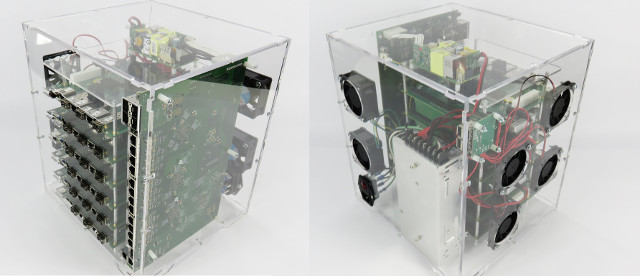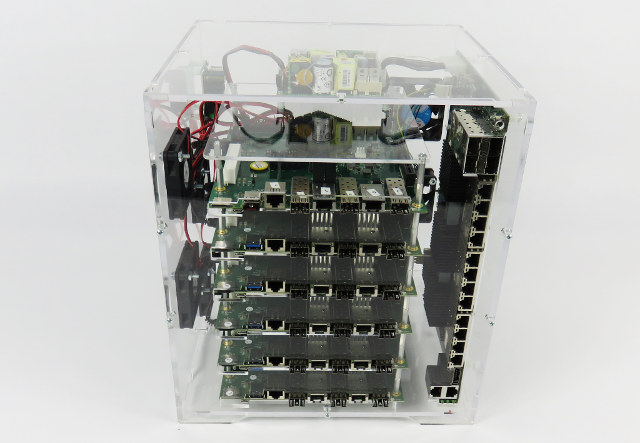If you are interested in networking applications, you may have already heard about Marvell ARMADA 8040 based SolidRun MACCHIATOBin board with multiple 10Gbps and Gbps network interfaces, three SATA ports, and more. PicoCluster has decided to make a cluster of 6 MACHIATOBin boards coupled with a Marvell Prestera DX 14 port, 10GbE switch for OpenDataPlane (ODP), Data Plane Development Kit (DPDK), OpenFastPath(OPF) as well as OPNFV (Open Platform for Network Functions Virtualization) .

The main features of the full assembled kit – named Cube – include:
- 6x MACCHIATOBin quad core Cortex A72 boards (24 cores in total)
- 1x Prestera DX 10GbE 14-port switch board
- 6x fans
- Power Supply
- Acrylic case
The cluster kit comes with 64GB micro SD cards pre-loaded with the latest OPNFV Danube software release for ARM integrated by ENEA Software AB. The cluster is said to be compliant with the OPNFV Pharos specification.

Three pre-order options are available with delivery scheduled for September 2017:
- $1,699.00 – Starter kit with all required items minus the MACCHIATOBin boards
- $4,699.00 – Advanced kit with all required items including the Marvell boards, but it still needs to be assembled
- $4,999.00 – Assembled Cube with everything as shown in the picture above
There’s also an option for 6 SSD mounts that add $100 to the kits. You may find more info on the product page, as well as on ARM Community’s blog.

Jean-Luc started CNX Software in 2010 as a part-time endeavor, before quitting his job as a software engineering manager, and starting to write daily news, and reviews full time later in 2011.
Support CNX Software! Donate via cryptocurrencies, become a Patron on Patreon, or purchase goods on Amazon or Aliexpress. We also use affiliate links in articles to earn commissions if you make a purchase after clicking on those links.




This reminds me somewhat of the goals we were seeking 16 years ago with our home-made high density servers (http://www.ant-computing.com/). The design looks comparable with high and low voltage wires lying together in the case 🙂
At this price it’s very expensive for what it is. Few people are going to spend $5k on something looking like a plastic toy unfortunately. Also, it lacks power redundancy and a power management board to remotely power cycle individual boards without having to power cycle the whole cube. All this could be provided for a very small fraction of the price, possibly via an *Pi board and 6 relays or MOSFETs. Fans should be temperature controlled because fans in acrylic case cause some very noisy resonance.
Otherwise it looks fun.
Hmm. I’m not sure that’s an optimal air flow design – it’s asymmetrical in such a way that some of the SoCs in there will receive less flow than others, depending on which level of the tower they’re located.
From my experience, the optimal airflow is along the DIMM slot, right above the SoC (given you don’t have a sizeable PCIe board plugged in).
That’s a nice understatement. 🙂
The heatsinks on the 10GbE PHYs on both the MacchiatoBins and the switch are there for a reason! By looking at the orientation of the fins on the huge switch heatsinks and where there’s airflow needed on the boards and how a inserted DIMM influences this IMO it’s obvious what to do (especially adding some 3D printed parts to control the airflow further –> we have 2 customers with servers in a data center, I can see it immediately in our monitoring when staff opens the rack doors since temperature reported immediately increases just by interfering with optimized airflow 🙂 )
I am wondering how does the 6x MACCHIATOBin connect to the switch? Or no connection?
@fkpwolf
12 nice looking CAT6 Ethernet cables allowing the finished design to consume twice as much space as it looks like on the photo? 😉
How come this from Solid-run does not apply?
This version of the ARMADA 8040 community board is an evaluation kit as defined in Section 2.1 of the rules of the Federal Communications Commission, 47 C.F.R. § 2.1. It is not FCC approved for resale. When assembled, this device may not be resold or otherwise marketed unless all required FCC equipment authorizations are first obtained.
@theguyuk
It may explain why they plan to ship it in September only. It may have passed FCC certification by then.
@cnxsoft
And Solid-Run’s ‘CEx7 A8040 Computer-on-Module’ based also on ARMADA 8040 is just around the corner (not really, just announced). But at least next year really compact but powerful OPNFV clusters could become reality also saving local cabling using PCB traces on a cluster baseboard.
Nice! Here’s the preliminary info page: https://www.solid-run.com/marvell-armada-family/com-express-7-a8040-com/
PicoCluster seem to have a sale on for some of their other designs